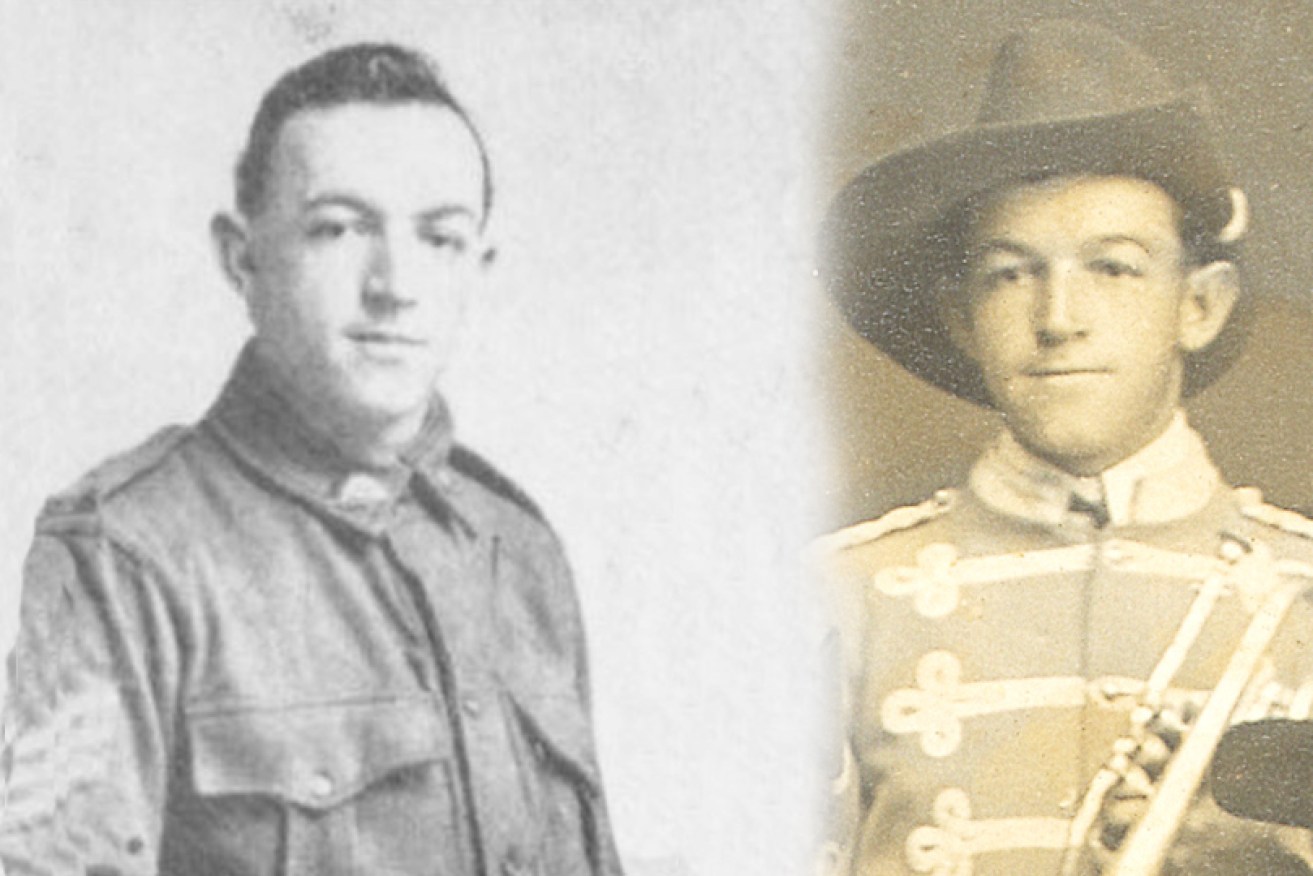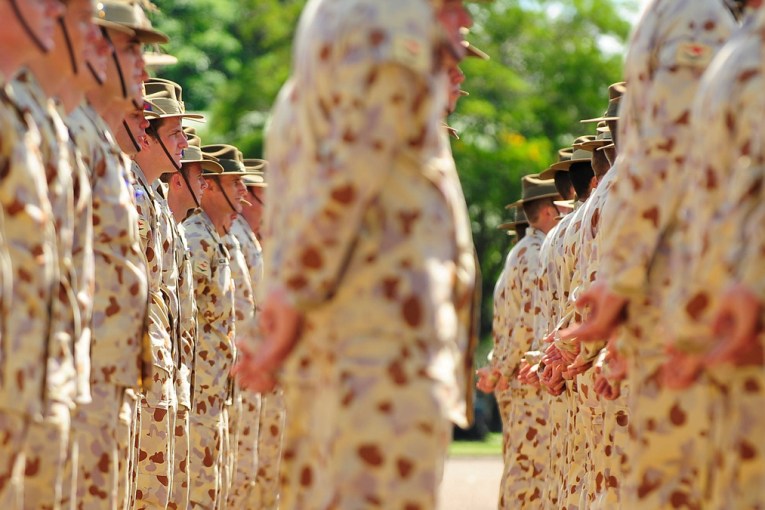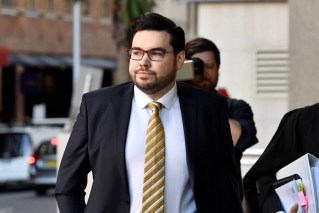Remembering Ted McMahon, the man who ‘stopped’ World War I

Ted McMahon and his trumpet became famous on the fighting fields of World War I. Photos: Australian War Memorial
When Sergeant Edward McMahon played The Rosary on his cornet in the foothills of Gallipoli in August 1915, everyone stopped to listen.
Ted, as he was known, was a bandmaster from the West Australian goldfields. He would often play for the troops and was asked to put together a small concert to boost morale before the August offensive – the Allies’ final attempt to seize control of the peninsula.
“On arriving on Gallipoli we found conditions rather tough, and lacking of any amenities for the troops, so naturally it was left to ourselves to make our own way in providing a little relaxation between our spells of duty in the lines,” he wrote.
“I would sit in my dugout in Reserve Gully at night and play my trumpet to the boys with a handkerchief in the bell to drown the sound.”
While it was often said that Gallipoli was too bleak for music, the gully the troops were sheltering in created a natural amphitheatre for a varied program of songs, recitations, and even a magic show.
“General [John] Monash, then in command of the Fourth Brigade AIF, sent for me on the afternoon of August 3rd, and asked me to arrange a camp fire concert in Reserve Gully where all the troops – Indian, New Zealand and Australian – were to be assembled and move out at midnight to start the offensive,” Ted wrote.
“The Turks were only a few yards away from our trenches on the hills above the Gully, and every round of applause from each item brought a vicious burst of machine-gun and rifle fire.”
Ted chose The Rosary by German composer Ethelbert Nevin, which was one of his favourites. The popular tune had been published in German, French, Italian and English, and he knew that anyone who was musical would know it.
“Both our troops and the Turks carried on as usual during the concert with rifle and machine-gun fire,” he later wrote.
“[But] the spectacle of thousands of soldiers from all parts of the Empire – black, brown and white – lining the sides of the steep hills on both sides and in the gully, to the accompaniment of chattering messengers of death, was indelibly printed on my memory.”
As the nephew of Hugh McMahon, a famous bandmaster in the West Australia goldfields known as “the Emperor of the cornet”, Ted knew all about the power of music.
“As I started to play, on this beautiful quiet night, when the sound of my trumpet would carry for a considerable distance, a real barrage of small arms fire broke out,” Ted wrote.
“During the second verse, only spasmodic shots could be heard, and as I started to play the final verse, all was still; not a sound could be heard … only the strains of Ethelbert Nevin’s famous song …
“At the conclusion there was a tremendous outburst of applause from all listeners, including those in the trenches above us, and then everyone settled down to the grim business of war …
“The charm of the music had cast a spell over all, and for a time the war was forgotten.”
Australian War Memorial musical artist in residence Christopher Latham said Ted McMahon’s story was a remarkable one, showing how music played an important role during the war.
“Music was performed or sung by the soldiers, often in the most modest and humble circumstances,” Latham said.
“It helped to heal the wounds that left no marks, and helped sustain the human spirit in the battlefield.
“It helped them come to terms with the war’s unresolvable contradictions – slaughter and heroism, kindness and savagery, beauty and barbarity – which lived side by side throughout the First World War.
“Those sad sentimental songs they sang helped them to express their grief and to remember what home felt like – what love felt like.
“It made them forget and cathartically release the terrors of the day.
“Whether they went to a concert party or were singing in the trenches, what matters is that it made them feel again.
“It provided an antidote to the traumas of the day and helped men to recover and to regain their sense of self.”

Ted McMahon’s cornet. Photo: Australian War Memorial
For Latham, and the soldiers on Gallipoli, Ted’s music had done just that, leaving a lasting impression.
Colonel James Lumsden McKinley spoke of the man he knew as the “Gallipoli Trumpeter” during an oral history interview for the Memorial in the 1970s.
“There was a trumpeter in one of the West Australian battalions … stationed right at Quinn’s Post,” McKinley said.
“Every night as the sun used to sink down, he used to play his trumpet.
“The firing on both sides came to a standstill when this happened, I suppose because he used to play [things like] Silent Night … and he’d let everybody around hear just as the sun went down.
“Of course, the Aussies never fired, neither did the Turks, and on one occasion I happened to be passing along the canal [trench] just as he was about to play and I thought, ‘I’ll have a look over and see what the Turks are doing’.
“Through a peephole in the side of the thing I noticed the Turks, when he finished, put their hands above the parapets clapping or else belting tins or something to show how much they appreciated our trumpeter playing Silent Night.”
Ted went on to serve on the Western Front and was awarded the Meritorious Service Medal for his actions in France, but it was his music that had “soothed the breasts of war-hardened men”.
He later joked to family that he was “the man who stopped the war”, if only briefly.
His rendition of The Rosary on Gallipoli had left a lasting impression on many, including Lieutenant A.J. “Gus” Harris, a bandmaster with the 14th Battalion.
“One evening the Australians held a concert in a natural amphitheatre on a sheltered slope behind their trenches,” Harris wrote.

Ted McMahon went on to be awarded the Meritorious Service Medal for his actions in France. Photo: Australian War Memorial
“Songs, recitations and mouth organ solos were heard with a background accompaniment of scattered rifle shots and machine-gun burst.
“[But] there was a dramatic change when Ted stood up and began to play … The Rosary.
“In the still night air the sound of the instrument carried a great distance. On both sides the men with fingers on triggers heard and paused to listen.
“The firing faded away until the only sound to be heard was the clear, yearning music of Ted’s cornet.”
–This story is part of the Music and the First World War project from The Australian War Memorial








